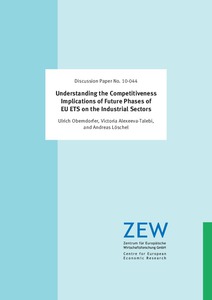Understanding the competitiveness implications of future phases of EU ETS on the industrial sectors
"Drawing on specific examples from products and subsectors within the EU ETS, this paper empirically tests to what extent those sectors are able to adjust their output prices when facing an input price change. The pass-through ability of sectors with respect to country- or regionspecific input...
| Main Authors: | , , |
|---|---|
| Institution: | ETUI-European Trade Union Institute |
| Format: | TEXT |
| Language: | English |
| Published: |
Mannheim
2010
ZEW |
| Subjects: | |
| Online Access: | https://www.labourline.org/KENTIKA-19183996124919011789-understanding-the-competitiven.htm |
| Summary: | "Drawing on specific examples from products and subsectors within the EU ETS, this paper empirically tests to what extent those sectors are able to adjust their output prices when facing an input price change. The pass-through ability of sectors with respect to country- or regionspecific input prices should serve as an indication of the pass-through ability of carbon costs by firms. While the focus of the study lies on estimating pass-through relationships in selected sectors of the UK economy, the advanced econometric methods, particularly related to the asymmetric price transmission, are applied. The latter means the ability of producers to differently pass on positive and negative input price shocks to the consumers. Our results provide new insights into the debate on the ability of pass-through of costs generated by the EU Emissions Trading Scheme. They show that the UK sectors are not capable to completely pass-through their costs into output prices, with the exception of UK ceramic goods." |
|---|---|
| Physical Description: | 77 p. Digital |

